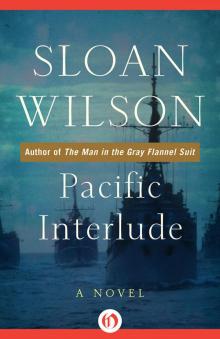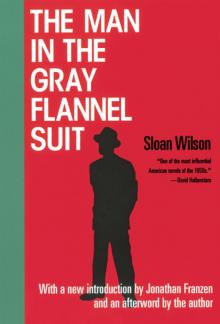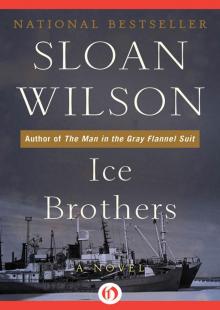- Home
- Sloan Wilson
Ice Brothers Page 19
Ice Brothers Read online
Page 19
The more Paul thought about it, the surer he was that this was the way the whole mess would be resolved. Nathan and Seth would get fitness reports bad enough to block future promotions or reassignment to any meaningful job. And if he himself tried to protect them by refusing to write their troubles up in the log, or even by trying too hard to present a case for them while talking with Mowrey, he might easily end up by joining them. It would, after all, be just as easy to transfer three reserve officers as two. If he demanded some sort of hearing, he guessed that few of the enlisted men aboard the Arluk would testify in his favor. To save their own skins, they would want to avoid a full investigation and would back the most powerful man aboard the ship.
Paul felt sick. Opening his eyes and squinting in the bright sunlight, he saw that Seth was still in his bunk, but Nathan was sitting at the table writing something. What would happen if Nathan turned out to be a sea lawyer and stubbornly demanded an investigation, or formally pressed his own charges? If it had to be proved that the captain was drunk, it would have to come out that Paul had not exactly spent the night as a teetotaler. Probably the Danes would be called as witnesses.
Suddenly Paul was angry at Nathan and Seth. There was no great crime, after all, in going ashore to get drunk, as the captain and he had done, but Nathan and Seth had been on duty aboard ship, they had stayed cold sober, and still hadn’t been able to control the crew. If they had gone to sleep early and had awakened to find themselves in the midst of a drunken set-to they might have just given up, once they had found that the skipper and executive officer were drunk ashore, but Paul knew that Nathan, at least, was just not that weak. No, Nathan sympathized with the enlisted men, felt it was unfair to deny them a party while the officers had one ashore, and probably turned a blind eye and a deaf ear to the theft of the booze at the start. Perhaps he hated Mowrey enough to get some kick out of the revenge of the enlisted men. Maybe he liked seeing Mowrey’s crew fuck up after all the old man’s attempts at discipline. If the whole ship was to be disgraced and punished after treating him so harshly, maybe Nathan would take pleasure in the revenge.
As he thought about this, Paul’s anger built. Nathan was always so goddamn righteous, so long suffering, so put upon! Sure, Mowrey didn’t like Jews and made no secret of it. That was wrong, ugly, but wasn’t Mowrey maybe a little justified in his contempt for Nathan as an officer? Openly ignorant of everything nautical, basically disdainful of everything military, eternally seasick and a thinly disguised intellectual snob, Nathan wasn’t really all that much of an asset to the ship. If as an electronic specialist he’d been assigned to a trawler as a wartime mistake, he could have had the guts to fight for a transfer instead of making a virtue of being so damn passive, couldn’t he? Passive—that’s what Nathan was, when faced by a crew difficult to control, a storm at sea, or an overaggressive commanding officer who was egged on by passivity. If they had to battle a German icebreaker, Nathan might also be too passive to return gunfire effectively. His passivity could be the death of himself and of all of them. Already, by allowing the crew to run riot, he had brought a kind of disaster on everyone aboard. And then he began to shake his head and pull himself up short. Jesus Christ, what was he doing …?
Yet this was not really a fair interpretation, Paul realized as his anger peaked. Nathan was undoubtedly doing as best he could in a situation which was nearly impossible for him. His passivity was really part of his courage, his refusal to give up and beg for a transfer. He was doing everything he could to learn an entirely new profession, and if the captain would give him a chance, could soon become an effective officer, Paul was sure. Part of Paul’s anger was fear and guilt, fear that Mowrey would kill him if he tried to stand up for his friend, and guilt because he was tempted to side with strength and turn against Nathan.
Pulling a pillow over his face to shield his eyes from the sunlight, Paul tried to go back to sleep. He had just succeeded when a messenger came to announce that the captain wanted to see him on the bridge “right now.”
As Paul hurried to put on his clothes, Nathan said “Good morning” in a curiously normal voice.
“Is it? I got to go face some Mowrey music.”
Nathan shrugged, a habitual gesture, and began to write in his notebook.
Paul wondered whether he was keeping a private record of events which he planned to submit to a court of inquiry. Oh, quit it, he told himself. The guy has a right. Wasn’t his pique mostly self-serving? And wasn’t his stuff about Nathan’s passivity and fitness as an officer mostly rationalization to take him off the hook with his own conscience if he did what Mowrey wanted? Why did he imagine that Nathan was plotting some kind of revenge? The man had never threatened that.
Without taking time to shave, Paul splashed his face with cold water, dried it on a dirty hand towel, and hurried to the bridge. Mowrey was alone there, hunched on a tall stool by the wheel. He looked pale and for once he was neither smoking or drinking.
“Where the hell have you been?” His voice was still strong.
“Sacked out.”
“I’ve been standing watch here myself most of the night. Remember, you and I are the only commissioned officers on duty now. I’ll take the eight to twelve. We’ll give Boats the twelve to four and you take the four to eight.”
“Aye, aye, sir.”
“Bring me the log. I want to see what you wrote about Greenberg and Farmer.”
Paul took a deep breath. “I didn’t write anything, sir.”
Mowrey flashed his sweet smile. “Didn’t I tell you to log the charges?” he said softly.
“Captain, I was very tired, and I’d been drinking too. A lot was going on. I just plain forgot.”
“You say you’d been drinking too. Are you implying that I was drunk?”
“Captain, I’m not throwing stones. We were both drinking.”
“Maybe so, but I’ve been standing watch right here all night. At least a dozen enlisted men can testify to that. I made notes about the weather every hour in my own hand. Before that, I broke up the party and got the men aboard all right. I took the ship out the channel all right. Who’s to say I was drunk?”
“I don’t know, sir. But if we have an investigation, you’d have to court-martial just about every man aboard the ship. Can’t you just forget it, sir? Can’t you just write it off as a bad night?”
Mowrey gave another sweet smile and his voice continued to be sweetly reasonable. “Sure, a nice guy might forget it. But the cargo was breached and about fifty cases of booze were stolen. They weren’t my property. They were consigned to the Danes all up and down this coast. When they don’t get the booze they ordered and paid for, they’ll complain to the authorities. Now do you want to be the one to explain that we just had a bad night?”
“Couldn’t we replace the booze, sir? It would be better to take up a collection for that than to get everybody court-martialed.”
“Do you have any idea how much a bottle of booze is worth up here, even if you could find fifty cases of it?”
“Sir, I could find it and I could get the money,” Paul said desperately. “Believe it or not, I’ve been pretty good at getting things done when I had to—”
“Why, Yale, maybe you could buy booze at the North Pole. But even if you could, what would you do with officers who can’t control the men?”
“I think I’d give them one more chance. That would be better than giving the whole ship a bad name. Any investigation would do that, wouldn’t it, sir?”
“When I prove that an ensign and a warrant officer couldn’t stop the men from running wild while the ship was moored to a wharf and I was ashore on official business, my name won’t be hurt much,” Mowrey said mildly. “I’m already on record with complaints about the quality of the officers assigned to me. My ass is covered. All I got to do is write up a report and hang somebody. That will be a hell of a lot easier than trying to replace the booze.”
“Why? If I could do that?”
“Yale,
the only place to get booze up here is army bases. They get a hundred dollars a bottle there. That’s twenty-four hundred dollars a case for two dozen bottles. How much would fifty cases come to?”
Mowrey’s hand shook a little as he took a pencil from his breast pocket and a scrap of paper from his wallet. “A hundred and twenty thousand dollars,” he said. “Can you take up a collection and raise that?”
“Jesus Christ,” Paul said. “Look, if we bought the booze legally, it would only be a few hundred dollars. Fifty cases! That’s not so much.”
“And how are you going to buy it legally?”
“I don’t know yet. Maybe there’s another way. What if we say we loaded the stuff onto the wharf and it was stolen by the Eskimos. After all, they drank their share.”
“So we blame it on the poor Eskies. Do you think the Danes would go for that?”
“Can’t we say we dropped the booze overboard by accident while trying to unload it? A cargo net broke. There’s not a man aboard who wouldn’t testify to that.”
Mowrey smiled again. “There’s one thing that Headquarters would never believe, and that’s the loss of booze by accident. I’d rather try to sell them the idea that the whole damn ship just took off and flew. No, Yale, we have to hang someone, and if we have to hang someone, why not hang the two officers who couldn’t control the crew?”
“Mr. Green may not be so easy to hang,” Paul said quietly.
“What does that mean?”
“Captain, Mr. Green is not stupid. He may figure that he and Mr. Farmer shouldn’t have to take the rap alone. After all, they’re the only ones who stayed sober. I don’t think that they feel they did anything wrong—”
“So they can throw dirt in our faces. Headquarters is not going to court-martial the entire crew. They’re not going to take me off this ship because they don’t have a replacement. Greenberg and Farmer they can hang and maybe you, if you take their side.”
“Couldn’t we just transfer them, sir? Wouldn’t it be easier?” Paul was getting desperate.
“I’ve thought of putting Farmer in a supply depot and Greenberg on a weather ship that would keep him out in Davis Strait almost all the time, but how is that going to help us to explain the loss of the booze? There’s no way out of hanging someone.”
Paul was fresh out of ideas, said nothing.
“Farmer we might let go,” Mowrey continued. “He can stand a watch and he’s not bad on deck, except he can’t handle men. But Greenberg was the senior officer aboard. He had the duty. There’s no way I can save him, or ought to.”
“You know, sir, maybe no one could control those men once they got going. And if he was asleep when it started—”
“Do you think it would have happened if I’d been aboard?”
“No, sir.”
“Would it have happened if you had been aboard?”
“I don’t know, sir. I suppose I would have yelled a lot but—”
“I bet you would. You were beginning to shape up, Yale. Too bad you’ve fouled up now.”
Paul flushed. “What do you mean?”
“You disobeyed my direct order to log charges, or you were too drunk to carry it out. I don’t plan to bring charges against you, Yale, but how can I give you a good fitness report? And how can I keep you aboard here or recommend you to any ship? You’re seasick as soon as we hit open water, and you’re not reliable in port.”
“I had an idea I was getting better, sir.”
“So did I for a while there. And I might give you one more chance. First of all, log the charges against Greenberg. Leave Farmer out of it if you want. It will be a little easier to hang just one man. One more thing. They not only stole from the cargo, they got into my cabin and took my personal supply. Almost two cases. Since you say you can get booze at the North Pole, try it. We’ll be at an air base before long. Your cooperation with me might change my mind about you.”
Before going to his quarters, Paul went to the forecastle for a cup of coffee. He drank two before going to the wardroom to see Nathan, who was still sitting at the table writing in his notebook. He glanced up as Paul came down the companionway, his narrow, craggy face looking more mournful than ever.
“How’s the captain?” he asked.
“Oh shit, Nathan. He wants to hang you.”
Nathan shrugged and said nothing. Seth sat up in his bunk. “I suppose he wants to hang me too,” he said.
“No, I guess I talked him out of that.” Which was true, Paul felt, and he wanted to get credit for it. In his mood he needed all the credit he could get.
“Good for you,” Nathan said wryly.
“You can fight him,” Seth said. “By God, I’ll back you up.”
Nathan shrugged again. The silence seemed to hum.
“Are you going to ask for an investigation?” Paul asked.
For the third time Nathan shrugged, a nervous reflex with him. Not indifference, Paul now realized. “When you come right down to it,” he said, “he can’t charge me with anything except incompetence when it comes to handling men, and I’ve got to admit there’s truth in that. Knute Rockne, I’m not. So hang me.”
“He can block your promotions,” Paul said. “He can get you a lousy assignment.”
“Well, Paul, I never exactly had any career ambitions in the service and as for getting a lousy assignment, what could be worse for me than this?”
Nathan was certainly not crushed the way he himself would be in such circumstances, Paul realized with admiration. And he also suspected Nathan was putting on just a bit of a show of bravado to make Paul feel less guilty about writing him up in the log, as he knew he had to do.
That day Farmer was restored to duty, but Greenberg was kept confined to his quarters, where he lay in his bunk reading night and day. He did not complain and for a while Paul was able to tell himself that he was just shrugging the whole thing off. Maybe he even was glad that he could spend his time with his books instead of standing watch on the bridge.
That’s what he told himself until two nights later when Seth had the watch and he went to the wardroom with a cup of coffee and a sandwich for Nathan. He found the tall, gaunt man lying in his bunk, his hands covering his face. Nathan tried to hide his eyes in his pillow, but his shoulders shook and his sobs could not be muffled.
“Christ, get out of here!” he said. “I’m all right. It’s just that I feel so fucking useless. The Nazis are taking over the whole goddamn world and I’m not even allowed on deck on my own goddamn ship.”
So much for passivity and not caring. Paul wanted to die.
CHAPTER 19
Although Nathan had technically been removed from duty, he continued to decipher messages. Because Sparks could not copy the fast, brief reports which Nanmak sent in Morse code to Commander GreenPat, Nathan soon took to sneaking up to the radio shack to do so. If the captain guessed that this was going on, he did not object. The whole crew was bored with the Arluk’s slow passage through the ice from one port where the men were not allowed ashore to another, and they eagerly awaited information about the far more dramatic struggles of their sister ship, aboard which many of the men had friends.
Much of the news from the east coast of Greenland appeared to be mysterious. Several sources of German radio signals, some of which frequently moved, were often detected over an area of a thousand miles. No one was sure whether this meant the presence of many German ships, aircraft, shore stations or decoys of intricate design. Red paint streaks on the ice were not the only tangible evidence of the German presence. While following those tracks, the Nanmak picked up an empty bottle which had contained Polish vodka. The Germans, like the Americans, were usually careful to sink all trash in weighted sacks. Mowrey, however, apparently felt some guilt about empty booze bottles, and Paul had occasionally seen him sneak one over the side without bothering to weight or break it when he thought no one was looking. The possibility that some man aboard the German ship had a similar problem gave Paul a peculiar feeling. Lik
e they said, war made strange bedfellows … and in strange ways.…

 A Summer Place
A Summer Place Pacific Interlude
Pacific Interlude Man in the Gray Flannel Suit
Man in the Gray Flannel Suit Ice Brothers
Ice Brothers